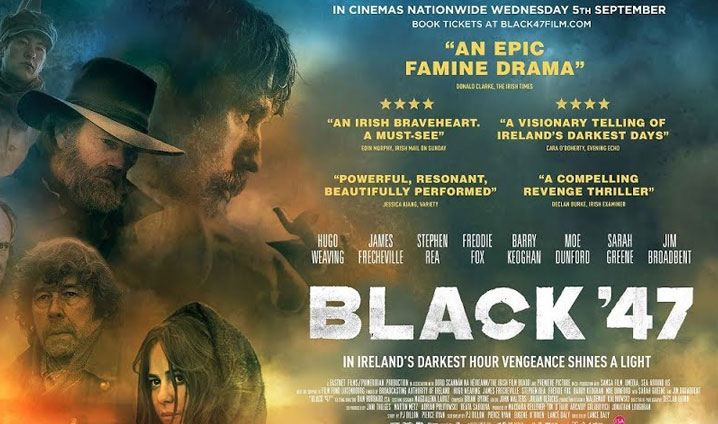Black 47 takes the audience back to one of the most horrendous eras in Irish History. A period that would have a significant impact on Ireland’s future as well as its relationship with its then ruler Great Britain. The Great Irish Famine saw one million Irish starve to death and over 2.5 million Emigrate. Hence, it’s not over the top to say the trauma of 19th changed Ireland forever.
Immediately the title is questionable, the famine, 1845 to 1851, is not the main subject of Dubliner Lance Daly’s film. The hunger is a harrowing backdrop, the stage of what the director describes as a revenge thriller.
Therefore, what is important is how the 19th catastrophe is used as a setting for the thriller.
The protagonist, Martin Feeney (played by James Frecheville), returns to Ireland after serving the British army as a Connaught Ranger in Afghanistan. On horseback, he comes back to Connemara in the midst of the famine and its devastation.
He’s soon hit by hardship inflicted on his family when finding the family cottage unroofed and a pig grazing inside it — a scene that has similarity to the classic Gladiator — a warrior returns to devastation.
Shortly after the discovery of his home in ruins, Feeney meets his sister in law Ellie (played by Sarah Greene), who tells how his brother was hung for resisting eviction by a vengeful judge; how his mother and remaining relatives were driven off their land to quake in muds and starve to death.
At first, Feeney has a logical plan of action. Like millions of Irish, he intends to emigrate with Ellie and her children to America. However, when he witnesses Ellie and her son being shot for refusing evicted from an abode they squatted in, his choice of action takes radically turn. In short, he’s had enough. He can no longer accept how Irish people are being treated and, hence, takes action into his own hands and declares: “The English cannot be forgiven.”
The picture is filled with an array of fine actors who give creditable performances such as Stephen Rea who plays Conneely. When Rea’s character chats at a Hotel fireplace with Lord Kilmichael (Jim Broadbent) who claims peasants have no appreciation of beauty, he gives an eminent reply: “Beauty would be held in much higher regards Sir. If it could be eaten.” Likewise, Barry Kehoe shows his talent when playing innocent Hobson.
The film’s setting catches the hardship of the famine. It gives a pertinent impression of what it was like to live in a country that was starving. Similarly, we get an apt example of the soup kitchens of the times unlike the renditions that are often seen in popular Irish comedies — there was nothing humorous about starving people having to change religion to receive some food.
As previously stated Black 47 is a thriller, but one which strikingly takes in the poverty, emigration, suffering and mistreatment of the Irish peasantry and for that it has rightly received great acclaim — the film, is the first to be set in the epoch of the famine, Plus, the story of Feeney’s revenge is equally stimulating. The result is Lance Daly competent mixture of history and fiction leaves the audience with something special.












